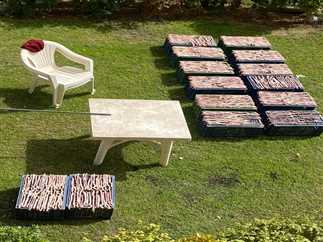The title of journalist and poet Farouk Gouida’s recent book–Raping a Country: Crimes of Land Pillaging in Egypt–might suggest that it is a solid piece of extensive research that dissects and contextualizes a notoriously corrupt trend that, in recent years, has attracted a lot of attention. Unfortunately, the content does not rise to that level of sophistication. “Raping a Country” is only a compilation of opinion columns published over the last five years that, lacking formal research, rely heavily on anecdote and are often clouded by Gouida’s poetic style.
In the 41 columns, the well-known journalist lists several incidents of public properties being appropriated to foreign and Egyptian businessmen in suspicious deals. Gouida dismisses the government as “a real estate broker.”
“The government has focused all its economic activities on selling state-owned assets,” writes Gouida. “Land has become the only good on which to speculate and conclude transactions. It is surrounded by a lot of suspicion and I do not understand why we do not take a stand vis-a-vis this serious chaos.”
The book is laden with national ethos. More than half of the articles are dedicated to foreign, particularly Israeli, attempts to acquire land in the Sinai peninsula, a region fully occupied by Israel for six years. In one piece, Gouida writes about a Zionist project that aims to annex 600 square kilometers in Sinai to the Gaza Strip. Palestinians could claim the land, giving away their territories in the West Bank.
“We should not think that Israel has become a nice dove that wants peace and security all of a sudden. We would be committing an injustice to ourselves if we assumed that Israel wants our prosperity and happiness,” he writes.
Raping a Country could not have hit the market at a better moment. The saga surrounding the selling of 8000 feddans to the Talaat Mostafa Group has made headlines in the local press for the last few weeks. The coverage gained momentum after the court declared that the transaction violated Egyptian law by selling the land to the company without calling for a prior auction. Ultimately, the president intervened and ordered the formation of a legal commission to address the issue.
And earlier this summer, yet another example of suspicious land deals stirred public outrage, when the government was forced to deal with accusations of misappropriation of public land to a company co-owned by Minister of Housing Ahmed El-Maghraby. The Central Agency for Public Mobilization and Statistics stated that the purchasing company under-priced the state-owned land by LE23 million. Again, the president intervened and cancelled the deal.
The book does not tackle these two cases, but it addresses the marriage between power and money, arguing for an immutable divorce. Gouida wonders, “Why is there an insistence to mix government responsibilities and business?”
In his article, “A Disengagement is Required,” the author discusses the appropriation of 127 feddans in the western suburbs of Cairo to a non-governmental organization formed by Prime Minister Ahmed Nazif and a group of businessmen when Nazif was still a communications minister. The books alleges that the NGO received the land, on which they planned to build a private university, without paying. The author contends that the NGO received far more land than necessary. “It is so unjust to appropriate all this space of 127 feddans for one university that won’t use more than ten feddans,” Gouida writes.
Not content with merely questioning Nazif’s activities, Gouida looks back to Nazif’s prior involvement in similarly flawed deals. In more than one article, Gouida shows how former Prime Minister Atef Ebeid–who spearheaded the privatization of Egypt’s land–conducted irregular transactions that cost the country millions of dollars. The book highlights the notorious case of the Egyptian-Italian businessman Waguih Siag who, in 2003, successfully sued the Egyptian government for US$133 million. More than 160 feddans of land in the Sinai had been appropriated to Siag to build a resort. But when the government found out that Siag’s project was partially financed by Israelis, they repossessed the land.
The government ended up compensating Siag a paltry sum. Gouida worries about the lack of accountability from officials like Ebeid. “Is the case going to be over by just compensating Siag? Does not the matter require investigating and questioning senior officials who were implicated in this tragedy?”
Gouida directs his wrath toward prime ministers and other senior state officials but refrains from putting any blame on the ruling regime or President Mubarak in particular, during whose era large-scale privatization deals have been marred by corruption. On the contrary, the author portrays the president as a messianic figure who intervenes at the last minute to fix all wrongs and prevent the squandering of public properties by his ministers. Gouida conveniently ignores the fact that these officials were selected and appointed by the president himself.
Gouida also fails to highlight the role of the President’s son, Gamal Mubarak, in deepening the overlap between business and politics. Gamal continuously spearheads neo-liberal policies and remains the rallying figure of Egyptian businessmen. Since 2004, he has successfully brought members of his business entourage in to run the cabinet, many of whom were entrusted with ministerial portfolios that help their businesses. By avoiding any explicit criticism of the president and his son, the author walks a fine line between exposing corruption and antagonizing the ruling regime. The fact that most of the articles compiled were originally published in the state-owned Al-Ahram newspaper may explain this cautious strategy.
Because he is a poet, Gouida’s style tends to be more sentimental than informative. The author’s energy goes to expressing his disenchantment in stylized prose and poetry rather than providing elaborate data on the phenomenon of land misappropriation. Consequently, the book lacks vital information like when land sales began, what kind of policies encouraged it, and what political and economic reasons stood behind the boom. In the end, “Raping the Country,” is more of a rant, possessing spirit but little real information.




